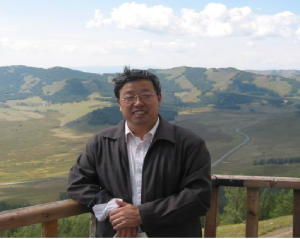 Dr Wantai Yang received his bachelor’s degree from Tsinghua University in China in 1982 and MS degree in 1985 from Beijing Institute of Chemical Technology (presently known as Beijing University of Chemical Technology, BUCT), and Ph.D. degree from Royal Institute of Technology in Sweden in 1996. He started his research career in 1985 at BUCT where he is currently a Professor of Polymer Chemistry and serves as Dean of College of Materials Sci. & Eng. He has published more than 290 peer-reviewed papers in international journals and filed over 15 patents. He also has been an invited speaker and/or chairman at more than 20 international meetings. Professor Yang has received many honors and awards for his outstanding research achievements, including Natural Science Award of Ministry of Education (2009), China National Science Fund for Distinguished Young Scholar (1999) and Chair Professor of Cheung Kong Scholars Programme (2001). He is the Vice-President of Chinese Society for Imaging Science and Technology (CSIST), and members of the editorial board of several journals including Biomacromolecules, Chinese Journal of Polymer Science, Membrane Sci. and Tech., Process Engineering and Thermosetting Resin.
Dr Wantai Yang received his bachelor’s degree from Tsinghua University in China in 1982 and MS degree in 1985 from Beijing Institute of Chemical Technology (presently known as Beijing University of Chemical Technology, BUCT), and Ph.D. degree from Royal Institute of Technology in Sweden in 1996. He started his research career in 1985 at BUCT where he is currently a Professor of Polymer Chemistry and serves as Dean of College of Materials Sci. & Eng. He has published more than 290 peer-reviewed papers in international journals and filed over 15 patents. He also has been an invited speaker and/or chairman at more than 20 international meetings. Professor Yang has received many honors and awards for his outstanding research achievements, including Natural Science Award of Ministry of Education (2009), China National Science Fund for Distinguished Young Scholar (1999) and Chair Professor of Cheung Kong Scholars Programme (2001). He is the Vice-President of Chinese Society for Imaging Science and Technology (CSIST), and members of the editorial board of several journals including Biomacromolecules, Chinese Journal of Polymer Science, Membrane Sci. and Tech., Process Engineering and Thermosetting Resin.
His research interest focuses on basic/fundamental chemistry for polymer synthesis and modification. At present his main directions include photopolymerization, controlled/living polymerization, heterogeneous polymerization, new chemistry for surface modification of organic polymeric material.
For more information, see: http://www.cmse1.buct.edu.cn/ywt/cncss/yjly.asp
What was your inspiration in becoming a chemist?
There are two reasons for me to become a chemist. One is the strong will to know what is polymer science, which seems so curious and mysterious to me before I went to university. Another is due to my high school teacher, who is a very kind person. When I knew he graduated from major of Polymer Science of Tsinghua University just before applying to university, I firmly determined to study polymer science.
What was the motivation to write this article? (DOI: 10.1039/C2PY20117H)
As we known, although the developments in the past 20 years have involved a series of breakthroughs in the living radical polymerization (LRP) field, we have to face the fact that due to inherent drawbacks for each method, even abundant efforts have been endeavored, large-scale industrial applications of LRP remain a big challenge, and a possible alternative solution is return to full organic system. We have presented the first example of living radical graft polymerization on the surface of polymeric materials by use of benzophenone (BP), xanthone and 9-fluorenone as graft polymerization photoinitiators (Macromolecules, 1996, 29, 3308). Therefore, one motivation of this work is to direct the similar reaction into bulk and solution polymerization system to open/explore a novel controlled/living radical polymerization. While another motivation, we hope, our work could attract more chemists pay attention to full organic, especially to this kind of system with cycloketone compounds.
Why did you choose Polymer Chemistry to publish your work?
Although it is a new journal, Polymer Chemistry has become one of top journal in polymer science. It is our great pleasure to publish our work in this journal due to its good visibility.
In which upcoming conferences may our readers meet you?
I will attend the 20th Annual International Conference on Composites or Nano Engineering, ICCE-20, July 22-28, 2012 in Beijing and the 244th ACS National Meeting in Philadelphia on 19–23 August 2012.
How do you spend your spare times?
I enjoy swimming, sing songs, or listen to music.
Which profession would you choose if you were not a scientist?
I would probably be a farmer or architect.










